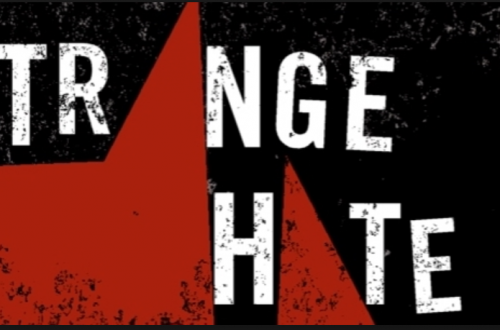This is a guest post by David Watkins.
We are all now familiar with Ken Livingstone’s controversial claim that
when Hitler won his election in 1932, his policy then was that Jews should be moved to Israel. He was supporting Zionism – this before he went mad and ended up killing six million Jews.
Thanks to three fine pieces by Paul Bogdanor, we also now know a whole lot more about Livingstone’s “source” for this claim – the anti-Semitic Trotskyist propagandist Lenni Brenner, whose writings have been published by the neo-Nazi Noontide Press. As Bogdanor concludes here, “Brenner is a propagandist, not a historian, and only a fool or a knave would rely on his books.”
As Dave Rich explains here, Livingstone
…was simply regurgitating Trotskyist propaganda that first appeared on the British left in the 1980s and had a strong influence on him. This propaganda cherry-picks examples of contact and negotiations between Zionists and Nazis in the 1930s and 1940s and uses them to place Zionism and Nazism alongside each other, as if they are somehow connected.
Hitler never wanted Jewish rights or self-determination, he wanted the exact opposite. Some Zionists thought they could save Jewish lives by negotiating with Nazis, but this was an act of desperation and nothing more… Mr Livingstone… ignores all this to make his ugly political defamation of Zionism, the very movement that Jews invented as an answer to anti-Semitism.
The affair brings to mind another public figure, also no stranger to accusations of anti-Semitism, who has made a similar claim to that made by Livingstone. On page 243 of his book Christian Zionism: Roadmap to Armageddon? (Inter-Varsity Press, 2004), Stephen Sizer makes the following claim:
…in the 1930s the German Zionist Federation, the Stern Gang and Vladimir Jabotinsky, the founder of revisionist Zionism [i.e. various Zionist groups and leaders], were all sympathetic towards fascism, or collaborated with the Nazis.
Sizer’s source is the same as Livingstone’s: Lenni Brenner. The outcome is the same too. By relying on an anti-Semitic source to link Zionism with Nazism, Sizer – like Livingstone – makes an anti-Semitic statement.
That Ken Livingstone and Stephen Sizer should make similar, anti-Semitic claims is unsurprising. What is interesting is the respective reactions to each, from their closest political and/or doctrinal allies.
Despite doing so reluctantly, despite remaining in denial about Labour’s anti-Semitism problem (and for all that some continue to dismiss concerns about anti-Semitism as “smears” or as “cynical attempts” to undermine his leadership), Jeremy Corbyn has at least suspended Livingstone pending an investigation, and has set up a fuller inquiry into anti-Semitism (and other forms of racism) within the Labour party. Shadow Chancellor John McDonnell has called upon Livingstone toapologise; it remains to be seen whether Livingstone will be banned for life, which appears to be McDonnell’s preferred option. For Sadiq Khan, “Ken Livingstone’s comments are appalling and inexcusable. There must be no place for this in our Party.” Lower down the Labour food chain, a group of London Assembly candidates and council leaders have called for Livingstone’s expulsion.
Such measures and statements are seen by many as half-hearted and flawed. But here’s the thing: these Labour figures have at least said and done something, rather than nothing. They have at least given the impression that they care about the issue.
Now let us compare this with the reaction to Stephen Sizer by the conservative evangelical Christian leaders with whom he identifies most closely. It is of course true that Sizer was eventually disciplined by the Anglican hierarchy. However, Sizer identifies himself as a conservative evangelical, and so it is instructive to examine the response to his statement (and other actions) by other conservative evangelical leaders, and compare this with the response to anti-Semitism from Jeremy Corbyn’s Labour party.
Sizer’s linking of Zionism with Nazism, and his citation of Lenni Brenner, did not prevent his book being published by Inter-Varsity Press (IVP), probably the leading conservative evangelical publishing house in Britain. (Nor, for that matter, did his citation on pp. 21-22 (and on Press TV) of Holocaust Denier Dale Crowley; nor his subtle insinuation of Israeli complicity in 9/11 in a footnote on p.251.) They did not prevent the book being warmly endorsed by a number of high-profile conservative evangelical leaders, including the late John Stott, the well-known preacher Dick Lucas, the former Principal of Oak Hill Theological College David Peterson, and the trainer, pastor and writer Graham Beynon. IVP later invited Sizer to write a second book on the subject for a more popular audience, Zion’s Christian Soldiers? (IVP, 2008). Whereas Ken Livingstone was suspended from the Labour Party for relying on Lenni Brenner to link Zionism with Nazism, conservative evangelicals did not bad an eyelid when Stephen Sizer did the same.
In fairness, we would not necessarily expect the average evangelical theologian, reviewing a book, to be familiar with Trotskyist anti-Semitism, still less to know about Lenni Brenner. Why wouldn’t they take Sizer’s claim at face value? (A respectable Christian publisher has less excuse, however, for not checking the source of an inflammatory statement.) Twelve years on, however, the evidence of Stephen Sizer’s anti-Semitism is inescapable. He has
-
forwarded material written by 9/11 conspiracy theorists and Holocaust Deniers
-
linked to numerous racist websites and given an interview to another
-
labelled photographs of Israeli soldiers “Herod’s soldiers operating in Bethlehem today“, mirroring the classic anti-Semitic accusation that all Jews are Christ-killers
-
promoted, via an interview on his Vimeo site, a boycott of four multinational public companies on the false basis that they “channel their profits to the Zionist agenda” – echoing the anti-Semitic myth that Jewish individuals and companies operate a shadowy influence on world affairs
-
equated Israeli treatment of the Palestinians with the genocide of 2/3 of European Jewry in the Holocaust – and that on Press TV, the propaganda channel of the Holocaust-denying Iranian regime
-
spoken at events organised by the Palestine Solidarity Campaign, many of whose branches appear to tolerate anti-Semitism
-
travelled to Iran as the guest of Zahra Mostafavi, the daughter of the Ayatollah Khomeini – a prominent supporter of the anti-Israel terrorist organisation Hezbollah, who has publicly paid tribute to child suicide bombers for their attacks on Israeli civilians.
-
worked in Malaysia with known Hamas fundraisers Viva Palestina, there making the outrageous claim that the “Israel Lobby” in the USA “buys every single politician” and again falsely linking Zionists with the Far Right
-
hosted an article (now removed) on his church website by Holocaust Denier “Israel Shamir”
-
made the tasteless insinuation that Monica Lewinsky’s Jewishness motivated Hilary Clinton’s criticism of Israel – undermining any claim Rev Sizer might make that his opposition to Israel is unrelated to the Jewishness of its people
-
made the deluded suggestion that the world initially held back from imposing a no-fly zone over Libya because Colonel Gaddafi and his son were linked to Israel and the USA by Jewish blood
-
championed the cause of Islamist hate preacher Raed Salah
-
suggested (again) that Israel was somehow behind 9/11
Nick Cohen’s words are apt: “Polite [Christian] commentators say that I must add at this point that ‘[Stephen Sizer] is not an anti-Semite’. Sorry to be a fact-checking bore, but if he isn’t a racist, then he is a remarkably stupid old man who in George Orwell’s phrase is ‘playing with fire without knowing fire is hot’.” Yet there is nothing in Stephen Sizer’s background to suggest that he is stupid.
It was the last of the above incidents, in January 2015, which finally prompted the Diocese of Guildford to ban Sizer from using social media for six months and to seek an undertaking from Sizer that he would no longer write or speak about the Middle East. The Archbishop of Canterbury approved. Whilst Sizer apologized – as he has done before – there is good cause to be sceptical.
The controversy surrounding Stephen Sizer has been widely reported: in the Jewish press; the Christian press (including the newspaper Evangelicals Now and the widely-read blog Archbishop Cranmer); and in the secular media. It has recently come to light again in connection with Jeremy Corbyn, who once wrote to the Church of England to defend Sizer; and in connection with Ken Livingstone, whose incendiary claim about Nazism and Zionism is similar to the one published by Sizer in 2004. And so this begs the question: how have Sizer’s conservative evangelical peers reacted to his multi-faceted anti-Semitic statements and actions? And how does this compare with the Labour Party’s reaction to Ken Livingstone? The answer, sadly, is disheartening.
-
IVP continue to market Sizer’s books. Contrast this with Roy Clements, a previously influential conservative evangelical leader who left his ministry in 1999 as a result of a sex scandal. IVP rapidly pulled his books from the shelves, and no longer market them, even though they were widely considered to be theologically sound. It is hard not to see a double standard here: is racism a less serious moral failing than sexual impropriety?
-
Christ Church Virginia Water (CCVW) retain Sizer as their vicar, notwithstanding his track record. This is perhaps unsurprising, since the church previously supported his international travel – even to conferences also attended byHitler-lovers and Holocaust Deniers.
-
Richard Bewes OBE, previously Rector of All Souls, Langham Place, London, had no problem either joining orremaining on the preaching team at CCVW – despite recognising anti-Jewish racism elsewhere.
-
It is believed that Christianity Explored Ministries no longer retain Sizer as an Advocate (trainer). However, they have made no public statement to this effect, and Sizer’s own website indicates that the association remains.
-
Sizer’s website also states that he is Vice-Chair of Biblica Europe Ministries Trust. Biblica is the translation sponsor and ministry publisher of the New International Version, the most widely read contemporary English translation of the Bible.
-
CCVW remains a “Linked Church” affiliated to Reform, “a network of individuals and churches promoting the gospel of Jesus Christ by reforming the Church of England”. A “Linked Church” means that “one or more of the leadership at this church is a member of Reform” – in CCVW’s case, this presumably includes Sizer himself. Reform haspreviously released statements to the media on issues of concern to conservative evangelicals.
-
Whilst a handful have expressed private concerns, not a single senior British conservative evangelical leader or ministryhas publicly censured Stephen Sizer or distanced themselves from him.
-
The South East Gospel Partnership is a group of conservative evangelical churches that work together on things like church planting and training. CCVW remains a partner church. When sent abundant evidence regarding Rev Sizer’s anti-Semitic activities, the SEGP Committee did not engage with that evidence. Their response – unbelievably – was that they saw ‘no justifiable grounds for breaking gospel partnership with Stephen.’
In short, conservative evangelicals have said and done virtually nothing in response to Stephen Sizer’s anti-Semitism. They have done even less than Jeremy Corbyn’s Labour party has done in response to Ken Livingstone’s anti-Semitism – which is saying quite something. If John Rentoul of The Independent can recognise that there is a serious problem with Stephen Sizer, why can’t conservative evangelicals?
It’s not too late for conservative evangelicals to show that they take anti-Semitism at least as seriously as Jeremy Corbyn’s Labour Party. It’s not too late for them to publicly censure Stephen Sizer and to distance themselves from him. Hope springs eternal but, sadly, I’m not holding my breath.
PS If you’re unsure why some of the things mentioned in this article are “anti-Semitic” as opposed to mere “criticisms of the Israeli government”, this article may help. This Working Definition of anti-Semitism may be helpful too.
PPS The SNP has got in on the act. Conservative evangelicals, what are you waiting for?


